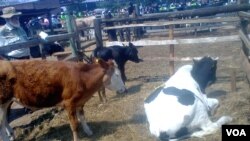An 18 hectare plot in rural Mutasa Central Constituency in Watsomba, about 40 km North of Mutare city and owned by the Makunike family, has become a beacon of successful dairy farming in the country.
The plot, known as Farm 60, has drawn national attention with owners Naboth and Jane Makunike winning small scale national Zimbabwe Association of Dairy Farmers 2015 competitions.
The small plot, which many say is a model of what small scale dairy farming is all about, is changing lives in the community as was witnessed by many at a recent field day.
The couple inherited the plot from parents Chengetai and Nelia Makunike, who are both late.
Naboth Makunike, a retired civil servant, says he started serious dairy farming after retiring in 2000.
FAMILY
The father of 12, four sons and eight daughters, said when the family ventured into dairy farming, it was initially for subsistence.
Makunike, whose farm was voted the best small scale dairy farm for 2015, says since the decision to go commercial 15 years ago, they have never looked back.
“We have been in the business for more than 10 years now and only five years ago that is when we decided to turn into a serious business venture and have never looked back,” said Makunike. “It has been a fruitful decision that we took and it’s paying off now.”
He plans to increase the herd from between 20 to 40.
“The family has been very helpful and starting with a small herd we are planning of increasing the number of the cattle to effectively run the dairy venture,” Makunike added.
GRAZING
The family uses zero grazing for their herd and their cattle feed on hay, maize silage, green grass from pastures and other stock feeds to reduce chances of infection and boost milk production.
“We are running the project on a zero grazing ideal as a way of avoiding contact with tsetse flies and other would-be causes of diseases like foot and mouth. Zero grazing is effective in that we are always watchful of the herd,” he continued.
The farmer says each of his cows produces an average of 20 litres of milk daily, adding he has a ready market at the Dairiboard Mutare depot.
He has Holstein, Jersey, Red Dane, and cross breeds of Holstein and Jersey and Red Dane and Holstein on his farm.
CHALLENGES
The enterprising farmer says despite his newly found fame and success, the project has had its own fair share of challenges.
“The main challenge is that of securing enough financial resources to meet the high standards that are expected to be kept at all levels and times in dairy farming but we will get there one day,” said Makunike.
He says stock feed and feeding regimes for the cows for maximum milk production and lactation is another area that gives the family sleepless nights.
Agriculture Deputy Minister responsible for livestock production, Paddy Zhanda, says Zimbabwe currently is facing serious milk shortages and is importing one million liters a month, adding small scale projects like the Makunike's are really coming in handy to help meet demand.
“As a country we need more of these small scale dairy projects to feed into the national demand,” said Zhanda. “It is also ideal to have at least a herd of 10 lactating cows for profitability of the dairy projects. As a country we have to strive to limit the quantities of milk we import so we can support small scale dairy projects.”
Zhanda says the country currently has only 15,000 dairy cows, a drop in the ocean considering the demand.
Emmanuel Zimbandu, chairperson of the Zimbabwe Association of Dairy Farmers, says the industry requires adequate funding from the government to ensure there is sustained growth in the sector.






